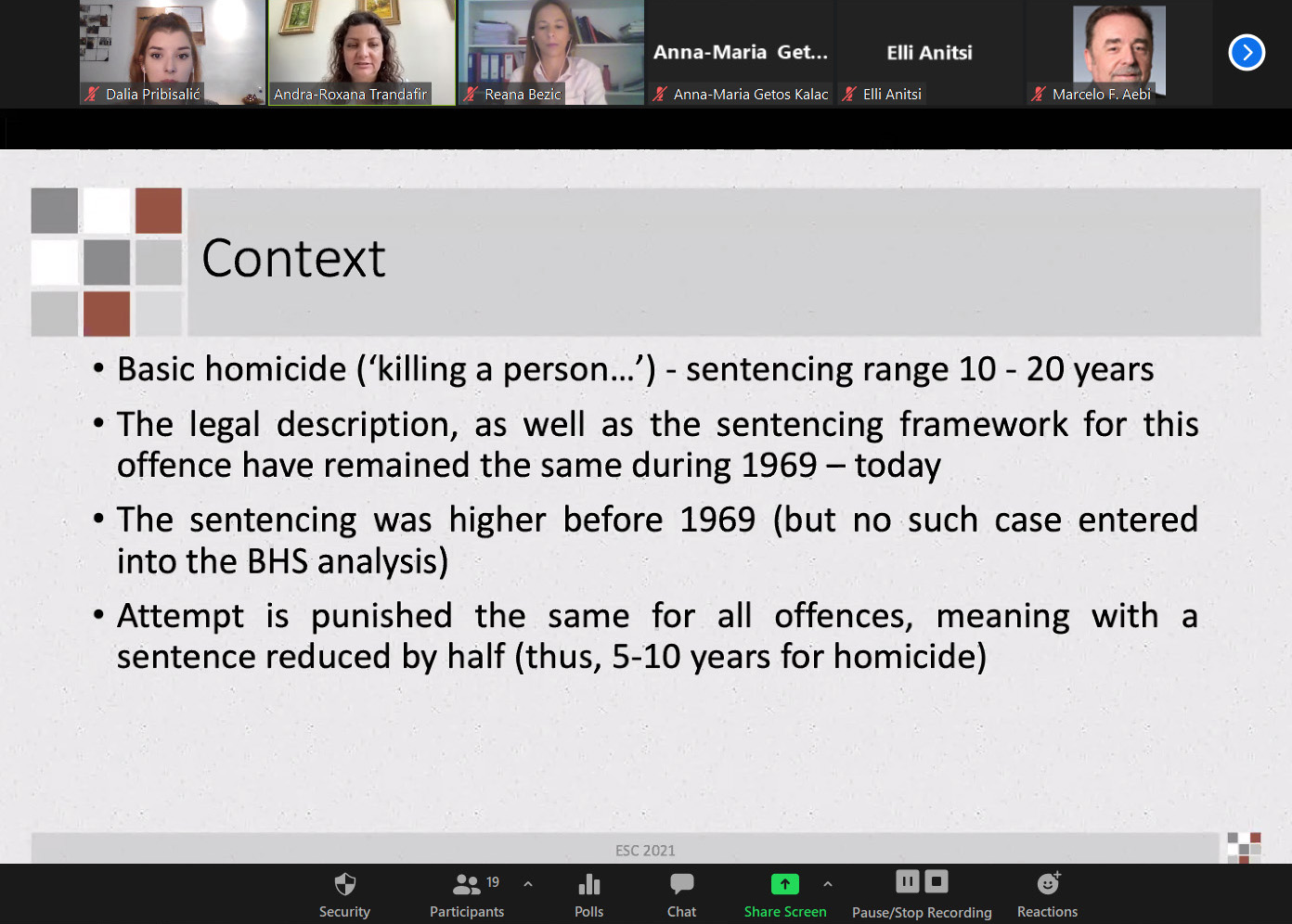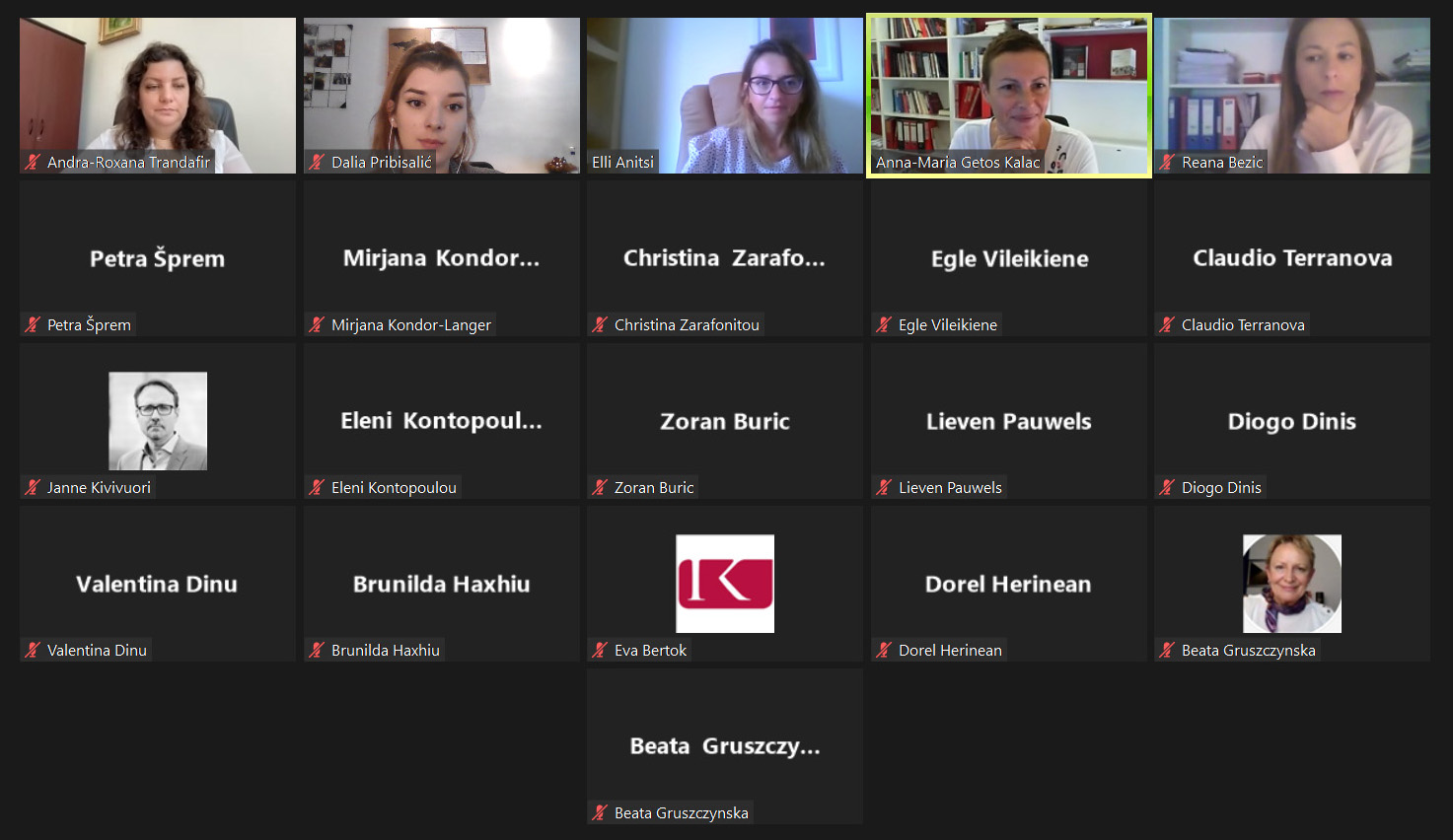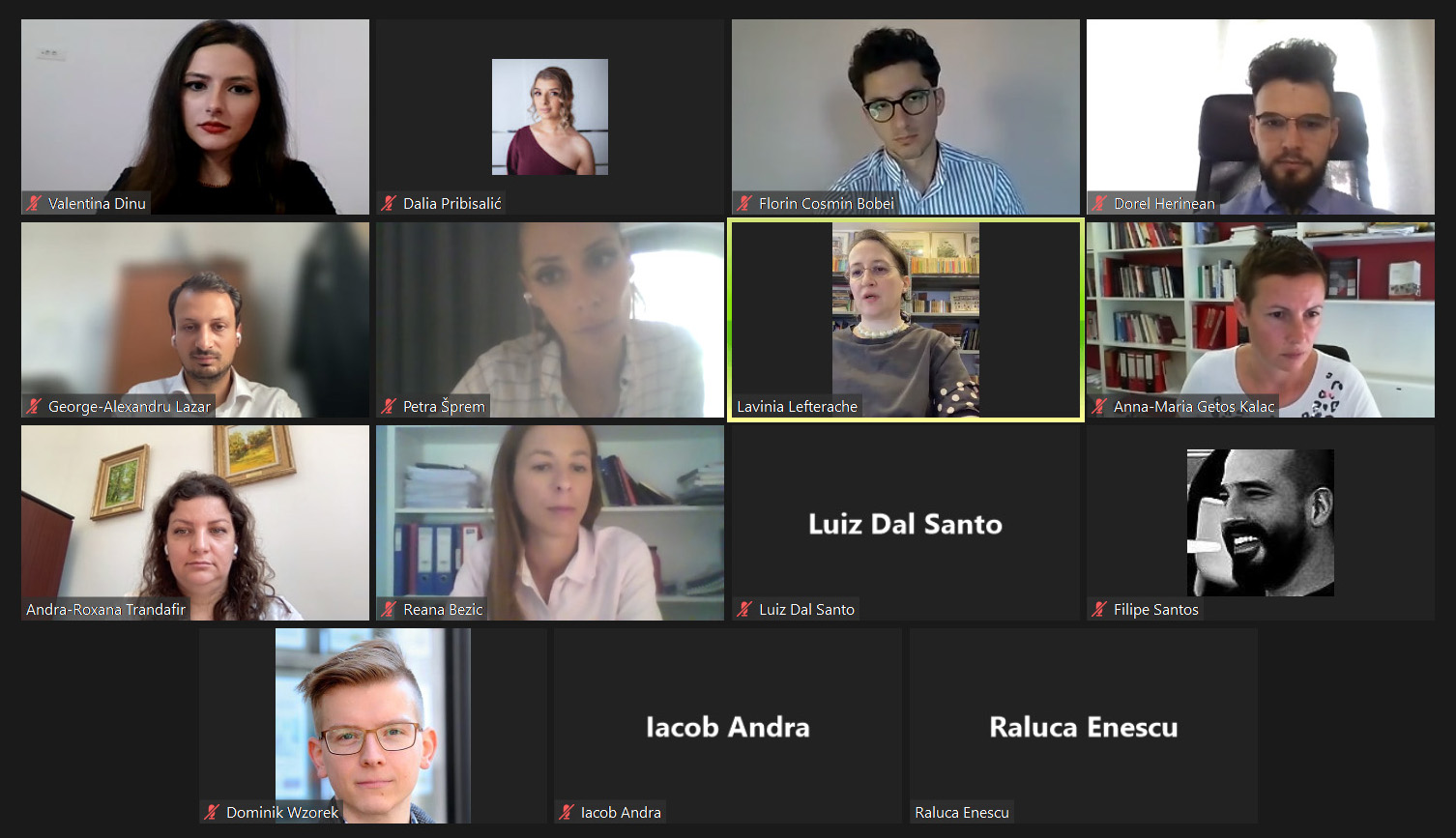
An annual conference of the European Society of Criminology (ESC) took place on 8-10 September 2021. This year’s conference was again held online due to the ongoing pandemic situation. The Balkan Criminology participated on 2 panels with total of 4 presentations (3 presentations at one, and 1 presentation at the other panel). Presentations were given by 5 Balkan Criminology team members.
The first panel pertained to results from the Balkan Homicide Study. The panel aimed to provide a summary of the regional findings from the Balkan Homicide Study (BHS), as well as an insight on the data obtained from Croatia and Romania following the study.
Balkan Homicide Study panel
Chair: Assoc. Prof. Dr. Anna-Maria Getoš Kalac (Head of Balkan Criminology)
Presentation 1
Assoc. Prof. Dr. Anna-Maria Getoš Kalac
Associate Professor
University in Zagreb, Faculty of Law
The presentation will provide a summary of regional findings from the Balkan Homicide Study (BHS), which fills a considerable gap in current European homicide research. The findings shed first light on the phenomenology of violence in this region of Europe. The BHS provides original empirical data from 2,073 prosecution and court case files in six countries: Croatia, Hungary, Kosovo, North Macedonia, Romania and Slovenia. The findings enable a first look at situational, criminogenic, victimogenic and procedural characteristics of (lethal) violence in the Balkans. What types of homicides occur in the Balkans? Who are the perpetrators and what motivates them? Who are the victims and what potential protective factors are on their side? It investigates the highly heterogeneous types of different (potentially) deadly situations, focusing on what might make them become deadly. Such an investigation of pathways into lethal violence becomes possible only if lethal violence (completed homicides) is studied together with non-lethal violence (attempted homicides). This approach considerably broadens the subject and scope of homicide research, which commonly deals primarily with lethal violence. Dismantling negative stereotypes of a growing and thriving Balkan society, these findings are of interest to all researchers in the region and abroad.
Presentation 2
Assoc. Prof. Dr. Anna-Maria Getoš Kalac
Associate Professor
University in Zagreb, Faculty of Law
Research Assistant
University in Zagreb, Faculty of Law
In 2016, the former Max Planck Partner Group for Balkan Criminology (Balkan Criminology Network) launched a new empirical study (Balkan Homicide Study (BHS)) on homicide in eight South-Eastern European countries: Albania, Bosnia and Herzegovina, Croatia, Kosovo, Macedonia, Romania, Serbia and Turkey. The study analysed not only completed, but attempted homicide offences as well. Due to the data consisting both completed and attempted homicide cases, it was possible to examine potential protective and risk factors for the victims that cause an attempted homicide to become completed. The Croatian sample consists of 563 cases, from a 25-year time period, with the oldest being from 1989, and the most recent from 2014. Because of the lack of these kind of research in Croatia, this study provides a much-needed insight into the phenomenology of (attempted) homicide in Croatia.
Presentation 3
Assoc. Prof. Dr. Andra-Roxana Trandafir
Associate Professor
Faculty of Law, University of Bucharest
Assistant
University in Zagreb, Faculty of Law
This presentation will focus on phenomenology of homicide in Romania based on the data from Balkan Homicide Study. The Balkan Homicide Study in Romania collected and analysed original empirical data on the most severe type of violence, homicides. The analysis will include not only finalized homicide offences, but also attempted homicide thorough examination of the regional samples of prosecution and court cases for the five-year period 2010 – 2014 in Romania. The main focus of the presentation is to answer questions on phenomenology of homicides, characteristics of victims and offenders, their relationships, situational circumstances and questions regarding criminal proceeding in Romania.
Violent crime in Greece: An integrative approach
This paper discusses the need for an integrative approach in understanding violent crime in Greece. According to police statistics, violent crimes tend to concentrate in disproportionately large percentages in the Greek capital. Regarding the qualitative characteristics of the phenomenon, during the last years an increase in use of violence is observed (Zarafonitou, 2016). The phenomenology of violent crime in Greece calls for an integrative approach that draws both from sociological and individual perspectives. More specifically this paper attempts to link offender decision making with the features of the physical and social environment. In this context three main themes are analyzed: (i) the phenomenology of violent crime in Greece, (ii) integration as the main characteristic of the science of criminology and methodological issues in the integration of theories and (iii) possible common grounds between ideas and concepts of offender decision making and socio-spatial criminological theories.

The other panel Balkan Criminology members participated at pertained to the topic of penology, and the BC members participated with one presentation.
Penology panel
Chair: Assoc. Prof. Dr. Andra-Roxana Trandafir
Presentation 1
Assoc. Prof. Dr. Anna-Maria Getoš Kalac
Associate Professor
University in Zagreb, Faculty of Law
Research Assistant
University in Zagreb, Faculty of Law
Doc. Dr. Mijo Galiot
University of Split, Centre for Forensic Science Research and Education
There is currently little if any scientific or professional discussion about a strategically designed and empirically-based management of the Croatian prison system. However, we occasionally encounter public debates about the challenging situation in Croatian prisons. These debates are mostly instigated by occasional tragic events exploited in the media (e.g. the death of a detained general in 2011 in the Osijek Prison) or alleged scandals (e.g. photos of a prisoner playing golf in the Valtura Prison 2013). The consequent media and public outrage are generally followed by brief statements from relevant institutions, which conclude any further discussion of the underlying strategic problem. Special prevention of criminal behaviour through resocialisation in the prison systems is a significant achievement of the criminal law acquis of Western societies. Although penal policy can be characterised as a constant search for new-best solutions, prison systems play an important role in achieving the purpose of punishment. However, it is questionable whether the prison system achieves its purpose, both in normative and practical terms. The answer to the question posed must be based on empirical data and evaluation analyses, while it presupposes a conceptual and methodological elaboration of clear indicators of the ‘purposefulness of the prison system’.

Presentation 2
Assoc. Prof. Dr. Andra-Roxana Trandafir
Associate Professor
Faculty of Law, University of Bucharest
Valentina Dinu
Faculty of Law, University of Bucharest
Florin-Cosmin Bobei
Faculty of Law, University of Bucharest
Imprisonment and sentencing in Romania. Effects on recidivism
In Romania, imprisonment is the penalty most often applied by the courts. However, its role in ensuring the educational function of punishment is being continuously questioned, especially when, after parole or release from prison, the convicted persons perpetrate criminal offences again, often of the same nature. The present study aims to analyse the extent to which prison fulfils both a preventive and an educational role or, rather, has a criminogenic effect. For this purpose, statistical data from the Romanian institutions will be analysed; such data concern the numbers persons sentenced to imprisonment in Romania and include the duration of imprisonment depending on the crime committed and its relationship with recidivism.
Presentation 3
Lavinia Valeria Lefterache
Faculty of Law, University of Bucharest
George Alexandru Lazăr
Faculty of Law, University of Bucharest
Dorel Herinean
Faculty of Law, University of Bucharest
Imprisonment in Romania. Perception and facts (Part II)
The perception of the duration and nature of penalties that should be provided by law and applied by the courts depends on a variety of factors. This presentation is the second part of a five years study, started in 2020, aiming to evaluate how the criminal code that have had entered into force in 2014 fulfill its goals in the eyes of young adults. Our goal is to asses if the courts of law and the society are on the same page.
Two more surveys are added to the previous evaluation. We continue to asses how well the alternative solutions have been implemented by the courts and if they have any impact on the rate of re-offending. Last year realities have let us to evaluate if the restrictions imposed by the pandemic affect the perception of deprivation of liberty. We are also aiming to illustrate the impact of the legislative changes in the Criminal Code of 2014, in order to assess the future of law in criminal matters.
